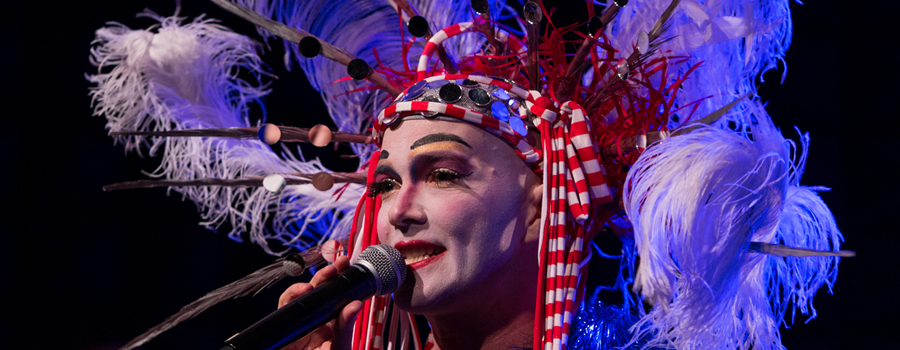On Thursday, Sept. 19, the Feminist, Gender, and Sexuality Studies (FGSS) Program hosted a panel discussion on gender performances and queer histories represented through sound and dance titled “Drag Queens and Radical Faeries and Judys, Oh My!” in Allbritton 311. The discussion centered on actor/performer/director/singer-songwriter Taylor Mac, who performed at the University this past weekend. Panelists included Assistant Professor of Theater, African American Studies, and Feminist, Gender, and Sexuality Studies Katie Brewer Ball, Associate Professor of Music Roger Grant, and Associate Professor of Dance and Feminist, Gender, and Sexuality Studies Hari Krishnan. The panel was moderated by Professor of Feminist, Gender, and Sexuality Studies, Science in Society, and Sociology Victoria Pitts-Taylor.
“To see a performer like Taylor Mac at a liberal arts university—instead of, say, in a theater in Manhattan—offers a tremendous opportunity,” Pitts-Taylor wrote in an email to The Argus. “We can see the event as an occasion to explore scholarship about queer performance, aesthetics and the arts more broadly and make links across dance, music, theater, creative writing, social theory, and cultural studies…. We want to make connections between what they do in their classrooms, scholarly and artistic work they produce, and broader issues of gender expression and freedom from heteronormativity.”
The panel commenced with Grant, who gave an overview of his paper entitled “Hyperbole and Unseriousness in Taylor Mac’s Musical Performances.” He first gave a detailed explanation of hyperbole and its various components as an aesthetic technique while emphasizing on its creation of different levels—a feature he referred back to several times throughout the rest of his talk. He revolved around Taylor Mac’s “A 24 Decade History of Popular Music,” the show whose abridged version Mac would be performing in the Center for the Arts.
He presented a detailed account of the performance from its conception to its content and its culmination in tours and a 24-hour performance in Brooklyn, N.Y. Grant explained how the piece is a hyperbole and experiment in radical storytelling, repeatedly emphasizing the performance’s meta-narrative—that community bonds are forged through tragedy and individuals are shaped by such experiences.
Following Grant’s talk, Brewer Ball discussed Larry Mitchell’s 1977 novel “The Faggots and Their Friends Between Revolutions” and Morgan Bassichis’s musical of the same name. She connected these works to the larger theme of the evening by explaining how the book and musical inform a reading of Mac’s avant-garde theatre.
“Something I am learning is a collective sense of performance prioritizes the group, friendships, and in that way refuses a fascial capitalist consumption of bodies,” Brewer Ball said. “I was reminded of the way the book made me feel, like the world could change, like, wow, maybe it already has at least at this moment.”
Her presentation focused on providing the audience with information about the book and musical within the larger context of gender and queerness. She focused on aspects of the texts such as language and how Mitchell asks the reader to imagine faggot not only as an “f word” but as pedagogical move. Brewer Ball emphasized her admiration for the way in which this concept rejects the norms of respectability and embraces a shared outcast status.
Brewer Ball was followed by Krishnan, who discussed the way in which different aspects of Mac’s personality and performances could be seen in his own choreographies. He explained how Mac’s personality resonated in his work “Uma,” which is a representation of the art of female impersonation in South Indian dance. He went on to discuss how judy—Mac’s pronoun in performance—ruptures notions of classism and popularity, which he tried to emulate in his 2004 work “Bollywood Hopscotch,” a whimsical, subversive take on Bollywood and classical Indian dance.
“I dismantle stereotypes and cliches which I continue to confront in my day to day personal life,” Krishnan said. “My work continues to be a personal response to anxieties around aesthetics, sexual orientation and diasporic cultural identities.”
Towards the end of his presentation, Professor Krishnan spoke about the project he is currently working on titled “Shiva Kissed Vishnu.” He emphasized the importance of a homoerotic narrative in the context of Section 377 of the Indian constitution being repealed, in which same-sex sexual relations being made legal in India.
“The event was wonderful, I couldn’t miss it or getting to see Roger Grant speak,” said graduate student Grant Cook. “I am excited to see the show. I have wanted to go for a Taylor Mac show for a few years and have managed to snag a ticket.”
Tanvi Punja can be reached at tpunja@wesleyan.edu
